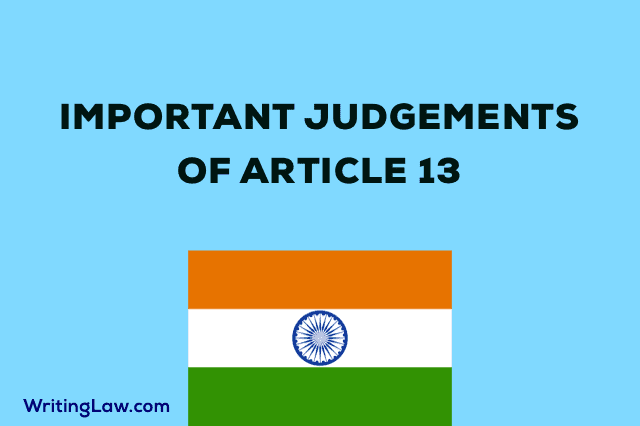
Article 13 of the Indian Constitution talks about ‘laws inconsistent with or in derogation of the fundamental rights.’ It makes these rights more powerful as it protects the individual’s fundamental rights if it is violated. It is an essential article of the Constitution. Here are some of the most important cases and judgements related to Article 13 of the Indian Constitution.
Important Judgments Related to Article 13
Important judgements related to Article 13 of the Indian Constitution are:-
1. Marbury vs. Madison, 1803
2. L. Chandra Kumar vs. Union of India, 1997
3. Romesh Thappar vs. the State of Madras, 1950
4. A.K Gopalan vs. the State of Madras, 1950
5. State of Gujarat vs. Ambika Mills, 1974
6. Deep Chand vs. State of UP, 1959
7. Basheshar Nath vs. Income Tax Commissioner, 1959
1. Marbury vs. Madison, 1803
This is an important case as it created and established the concept of Judicial Review. In this case, the US Supreme Court said that the court has the power to do a judicial review on legislative actions. The counterpart of this case (Marbury vs. Madison) in India is L. Chandra Kumar vs. Union of India.
2. L. Chandra Kumar vs. Union of India, 1997
In this, it was held that the Supreme Court, through Article 32 and the High Court through Article 226, have the power of Judicial Review. That means the SC and HC can judicially review the legislative actions. SC also held that the power of Judicial Review under these two articles is a part of the basic structure of the Indian Constitution, and no amendment can curtail this power.
3. Doctrine of Severability
Romesh Thappar vs. the State of Madras, 1950
A.K Gopalan vs. the State of Madras, 1950
These two cases talk about the doctrine of Severability. Supreme Court said that if some part of an act is unconstitutional and the rest is constitutional, then only the unconstitutional part should be struck off, and the constitutional part should be preserved.
4. Doctrine of Eclipse
State of Gujarat vs. Ambika Mills, 1974: In this, it was held that the doctrine of eclipse is applicable to citizens as well as non-citizens.
Deep Chand vs. State of UP, 1959: The doctrine of eclipse is not applicable to post-constitutional law.
5. Doctrine of Waiver
Basheshar Nath vs. Income Tax Commissioner, 1959: Unlike the US Constitution, in India, the waiver of Fundamental Rights is not allowed.
This is a guest post that has been written by the below-mentioned author. Opinions expressed are theirs.









Very impressive article you have written miss. Great work ! Keep it up all the best for your future.
Happy that you liked this law note. Thank you for your kind words.